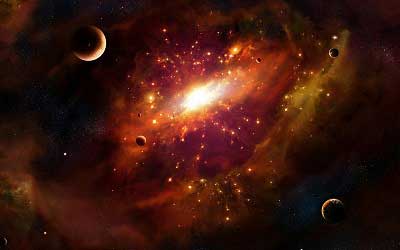
According to the Bible, God made the stars on the fourth day of creation. But even more remarkable is the fact that He is creating them still, though the latter miracle is considered not worth mentioning by any of the Bibleʼs authors. (I wonder why? The creation of new stars in enormous stellar nurseries is being chronicled continually in magazines and journals like Astronomy, Sky & Telescope and The Astrophysical Journal, just to name a few.)
- And God is still creating new planets (that continue to form out of rings of matter circling stars--see the above mentioned magazines).
- And God is still fusing simple hydrogen atoms together inside stars to create other elements with greater proton and electron numbers (the heaviest known elements are created during super nova explosions of stars).
- And God is still creating large multi-cellular organisms out of a single cell that keeps dividing over and over by a process called embryogenesis.
- And God is still transforming inorganic substances into organic ones, because there are tiny microorganisms that live by taking in nothing but water and inorganic molecules and turning them into more members of their own species. I am speaking of microorganisms that live directly on minerals, including plants that live on minerals and sunlight. Thatʼs where the “chain of life” begins, with the inorganic world and the organisms that ingest inorganic substances, and next comes all the forms of life that live on those organisms and so on and so forth. In fact, if you keep in mind the entire chain of life and the way the organisms at the bottom live on inorganic substances, then God is still creating human beings out of inorganic matter (and turning inorganic oxygen molecules into “the breath of life,” every time we inhale).
Still, creationists argue that
- aside from the continued creation of new stars;
- aside from the continued creation of new planets;
- aside from all the elements in the periodic table continually being created out of the simplest and lightest element of them all, hydrogen;
- aside from the continued creation of multi-cellular organisms from a single cell via embryogenesis;
- aside from the continued creation of living organisms out of inorganic matter which lay at the base of the chain of life;
- aside from the fact that organisms continually increase in number as well as branch off into new species (as even creationists admit);
- aside from all of that; creationists continue to claim that evolution is “prohibited by the second law of thermodynamics!”
Iʼd say that creationists are missing the forest for the trees, which continue to grow from tiny seeds; trees that become forests that continue to reach out and envelop as much of the earth as they can, and whose members continue to branch off (forgive the pun) into new species as they do so.
And none of that violates the second law of thermo-d. In fact the enormous number of animals that perish is the price paid for evolution, because life is a series of hurdles that an organism either makes it over or not, starting with conception in sexually reproducing species, then having to survive embryogenesis (half of all human zygotes donʼt survive it, which is admitted by pro-lifers as well), surviving birth, surviving childhood illnesses and infections (half of all children didnʼt live past the age of eight according to Buffon writing in the 1750s), getting past every hurdle in the way of the continuance of life from the time of conception to sexual maturity and mating. There are hurdles galore, biological, environmental, social, et al. Thatʼs what natural selection is about, the weeding out of countless zygotes, babies, children, adolescents, such that only some of them survive to produce the next generation, or they produce more offspring than others. Meanwhile not just individuals are included in the selection process, because for every species that does well, many sub-species and/or cousin species, do not do well, but instead perish over time. So that overall, the price of decay, of thermo-dynamics is paid. Yes, the evolution of new species does come at a tremendous price that is paid by nature.
Labels:Bible, entropy, evolution, inerrancy, inspiration, intelligent design, second law of thermodynamics, the Fall| Help Ed score 100% on YSlow. Server Fees & 🍪-free *CDN. This page was designed and tested by Night Owl using GTMetrix on 4/30/2017. | |||
| *Content Delivery Network | PageSpeed (100%) | YSlow (99%) | Onload Time 0.5s Fully Loaded Time 1.2s Pagespeed 100% YSlow 99% |